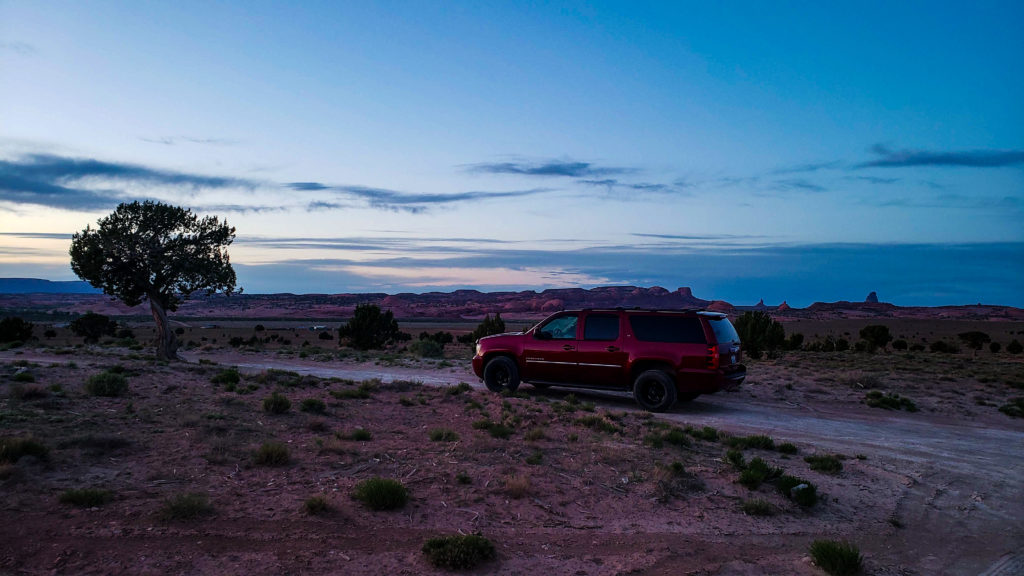Generally speaking, no, boondocking is not allowed on Indian reservations. Lands designated as “Indian reservation” were set aside for Native American tribes, and not for non-natives. Even though non-natives are allowed to use public roads and highways that run through reservations, the land-use itself is set aside only for natives.

Is Boondocking Allowed on Indian Reservations?
No, boondocking is generally not allowed. That is, non-natives are not allowed to enter into an Indian reservation and use that land however they please. Indian reservation land is not public land. However, all tribes are free to establish laws and regulations on how their lands may be used. But to the best of our boondocking experience, no such tribe has granted non-natives the freedom to set up camp wherever they want.
The Legal Basis Behind This
Lands designated as “Indian reservation” have special protections designated by federal law. Among these protections is a statute that prohibits any non-native from settling on lands granted to an Indian tribe…
Every person who makes a settlement on any lands belonging, secured, or granted by treaty with the United States to any Indian tribe, or surveys or attempts to survey such lands, or to designate any of the boundaries by marking trees, or otherwise, is liable to a penalty of $1,000. The President may, moreover, take such measures and employ such military force as he may judge necessary to remove any such person from the lands.
Title 25 U.S. Code § 180
What this means is that if you are not a member of an Indian tribe, you are not allowed to establish a settlement of any kind.
Some may argue that “settlement” is not the same as “camping”. However, when the United States created the laws for Indian reservations back in 1832, the idea that Americans might want to use these lands for recreation did not enter into lawmakers’ minds. Instead, it was intention of the United States, through a series of treaties with individual tribes, to offer sovereignty to native people.
As such, by the very definition and purpose of an Indian reservation, non-natives are not allowed to use such land.
The Only Privilege Non-Natives Have on Indian Reservations
U.S. law allows the federal government to pave highways through Indian reservations (Title 25 U.S. Code Chapter 8). Non-natives are thereby granted the right the use those roads. Otherwise, non-natives have no other privileges on native land.
Camping is Only Allowed in Areas Designated by the Tribe
- Non-natives are only allowed to camp in campgrounds and other areas designated for such use.
- Non-natives are only allowed to park overnight in areas designated for such use.
- The National Park Service has created several parks, recreation areas, and monuments inside reservations through a joint agreement with native tribes. Many of these properties include campgrounds.
- Many Indian casinos have RV parks and campgrounds on site.
Can Natives Boondock on Indian Reservations?
Yes, natives are allowed to boondock on their own tribal lands. This is dependent on the laws and regulations adopted by each tribe. But generally speaking, it was the intent of U.S. law to let Native people do whatever they want to do on their own land.


Can wells for water be dug on the Navajo Nation Reservation by and for the use of its native residents? And if not, why?
The Navajo Nation allows its own residents to dig water wells, but it’s a long, legal process. The tribal government has a webpage that spells out the requirements… https://watercode.navajo-nsn.gov/private_well_development.html
Why is Louisiana nor on the state of Boon docking rules?
This is so wrong. I am white and I grew up on the Yakama Reservation. I licked on it for 15 years and my parents lived there for 20 years.
Your post is not accurate. I am white and I grew up on the Yakama Reservation. I licked on it for 15 years and my parents lived there for 20 years.
Duane, this article is about non-natives camping, not non-natives living with other natives.